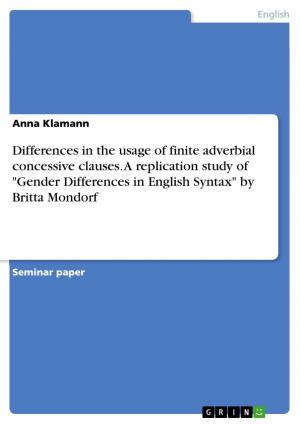Hybrid identity formation of migrants
A case study of ethnic Turks in Germany
Nonfiction, Reference & Language, Language Arts, Communication| Author: | Stefanie Schumann | ISBN: | 9783640831609 |
| Publisher: | GRIN Verlag | Publication: | February 15, 2011 |
| Imprint: | GRIN Verlag | Language: | English |
| Author: | Stefanie Schumann |
| ISBN: | 9783640831609 |
| Publisher: | GRIN Verlag |
| Publication: | February 15, 2011 |
| Imprint: | GRIN Verlag |
| Language: | English |
Seminar paper from the year 2011 in the subject Communications - Intercultural Communication, grade: 1,3, European University Viadrina Frankfurt (Oder) (Kulturwissenschaftliche Fakultät), course: Culture and Ethnicity, language: English, abstract: Within the last few years Germany has been confronted with a vast debate on integration policy. It was not until the year of 2005 that the first national integration law was enacted. Even though Germany has been an immigration country since the 1950s, the necessity of a specific law framework has been neglected blindly for decades. Already in 2006 about 23% of the children born in Germany had at least one foreign parent (cf. Foroutan & Schäfer, 2009, p.12). The media still talk about 'the migrant'. But it finally has to reach people's minds that there is no clear distinction between 'the German' and 'the foreigner'. In fact, the matter of identity has to be reconsidered. About 18.6% of Germany's overall population possess a migration background (cf. Wippermann & Flaig, 2009, p.3), which signifies, that these individuals face the challenge of cultural contradictory on a daily basis. The permanent negotiation of belonging characterizes the dichotomy between retention of the ethnic and adoption of the German culture. Hence, this phenomenon creates a specific kind of identity, the so called 'third space', which in the present work I will refer to as hybrid identity. The terms transnational and hyphenated identity are used synonymously in the relevant literature, but I will apply only to the former name to avoid any confusion. Moreover, this new kind of identity requires rethinking the concept of nationality and raises citizenship issues. The present work shall examine the phenomena of hybrid identity formation in detail: Under which criteria does it emerge and how is the synthesis of two cultural backgrounds depicted in everyday life? After introducing general findings on this topic, I will apply these aspects to the Turkish population in Germany by evaluating several surveys. Even though ethnic Turks do not appear to be the biggest ethnic group in Germany anymore, they represent cultural features including their religion, which makes the observation of their case study more controversial. Data on the German citizenship law will top off the chain of arguments concerning the necessity of nationality for the belonging of hybrid identities.
Seminar paper from the year 2011 in the subject Communications - Intercultural Communication, grade: 1,3, European University Viadrina Frankfurt (Oder) (Kulturwissenschaftliche Fakultät), course: Culture and Ethnicity, language: English, abstract: Within the last few years Germany has been confronted with a vast debate on integration policy. It was not until the year of 2005 that the first national integration law was enacted. Even though Germany has been an immigration country since the 1950s, the necessity of a specific law framework has been neglected blindly for decades. Already in 2006 about 23% of the children born in Germany had at least one foreign parent (cf. Foroutan & Schäfer, 2009, p.12). The media still talk about 'the migrant'. But it finally has to reach people's minds that there is no clear distinction between 'the German' and 'the foreigner'. In fact, the matter of identity has to be reconsidered. About 18.6% of Germany's overall population possess a migration background (cf. Wippermann & Flaig, 2009, p.3), which signifies, that these individuals face the challenge of cultural contradictory on a daily basis. The permanent negotiation of belonging characterizes the dichotomy between retention of the ethnic and adoption of the German culture. Hence, this phenomenon creates a specific kind of identity, the so called 'third space', which in the present work I will refer to as hybrid identity. The terms transnational and hyphenated identity are used synonymously in the relevant literature, but I will apply only to the former name to avoid any confusion. Moreover, this new kind of identity requires rethinking the concept of nationality and raises citizenship issues. The present work shall examine the phenomena of hybrid identity formation in detail: Under which criteria does it emerge and how is the synthesis of two cultural backgrounds depicted in everyday life? After introducing general findings on this topic, I will apply these aspects to the Turkish population in Germany by evaluating several surveys. Even though ethnic Turks do not appear to be the biggest ethnic group in Germany anymore, they represent cultural features including their religion, which makes the observation of their case study more controversial. Data on the German citizenship law will top off the chain of arguments concerning the necessity of nationality for the belonging of hybrid identities.















